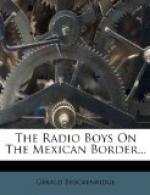It was great sport. For twenty minutes they crashed through breakers, wrestled, ducked each other, shrieked aloud secure in the knowledge there was nobody within hearing distance, and in general had a glorious time of it. At the end of that period they rubbed down briskly with rough towels until their bodies were in a healthy glow, then dressed and set out for the airplane shed.
This was located some distance back from the beach where a long, level stretch of sandy soil, unbroken by tree or bush, made an ideal landing field. The “shed,” as the boys termed it, was, in reality, a substantial structure of corrugated iron, well-anchored to resist the severe Atlantic coastal storms. It stood to one side of the route followed by the boys in going from the house to the beach, with the rear to them, and was midway between the two points and concealed from the house by a clump of trees.
When the matter of buying a plane was up for discussion more than a year before, after the boys and Jack Hampton, their absent chum, as well as Mr. Temple—himself an enthusiast about flying—all had become licensed pilots by taking a course at the Mineola flying fields, the question had been whether to buy a hydroplane.
That question finally had been solved by the purchase of a light, all-metal plane capable of carrying two passengers besides the pilot and able to alight on water and land. It was not a stock model but was built after a special design. All three boys had flown it, as well as Mr. Temple, and none had ever had an accident. Equipped with a radiophone head set, to which had been added recently a detector designed by Bob and Frank to increase the receiving radius, this plane was the boys’ especial pride.
What was their dismay, therefore, when they rounded the shed from the rear and found the great doors which they had left padlocked several days before standing open and the interior empty. For several moments they stood as if rooted to the ground, staring in stupefaction. Then Bob groaned, and Frank echoed him.
“Gone.”
“Gone.”
Frank was the first to recover from his dismay and ran forward to look at the broken padlock, dangling from one leaf of the great folding doors. “Cut through with a file,” he called excitedly to his chum. “And this set of big bar locks above and below the padlock were cut the same way.”
“I always said we should have had one of those rolling iron screens, fitting solidly into the ends of the side walls and rolling up into the roof,” groaned Bob, passing on into the interior. “But what’s the use locking the barn after the horse is stolen.” Disconsolately he moved around the interior of the shed, as if expecting to find concealed somewhere the airplane which he could not yet bring himself to believe had been stolen.
Suddenly he let out a whoop. “Frank, look at this.”
“Great Scott, an Iron Cross,” cried Frank, seizing the object held out. A German Iron Cross it was. “And here you can see how this ribbon frayed through and parted from the clasp,” added Frank.




